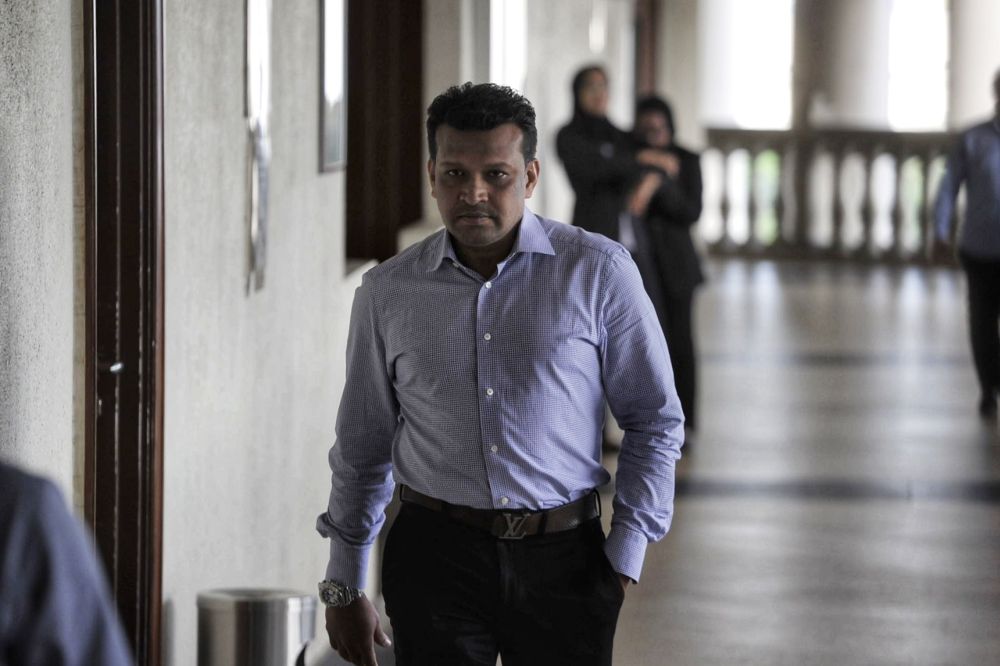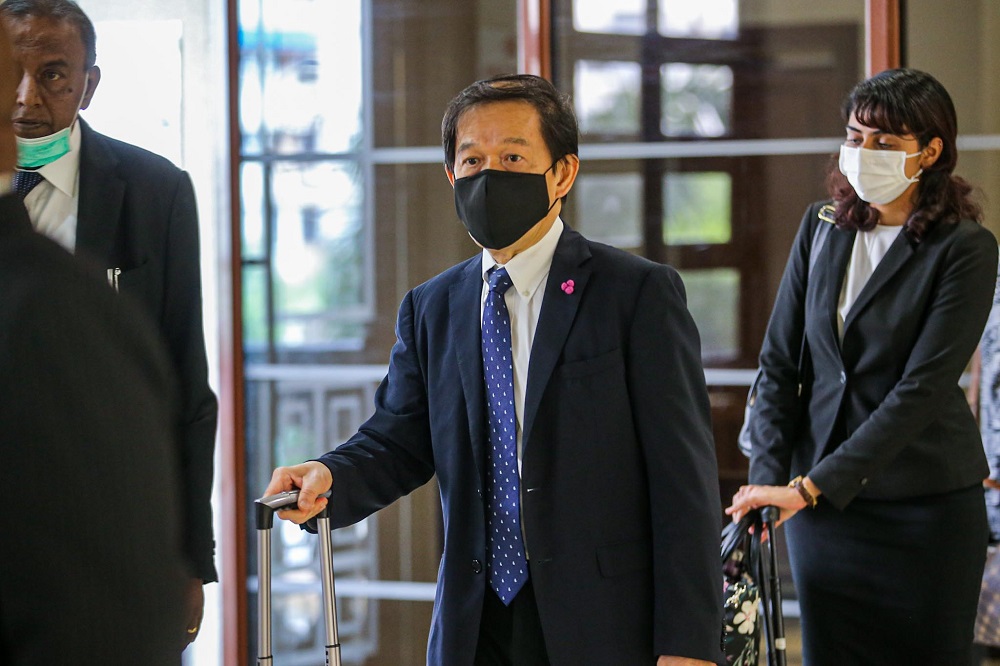KUALA LUMPUR, Sept 14 — Former home minister Datuk Seri Ahmad Zahid Hamidi should not have been charged with corruption over his brother’s RM250,000 loan from a businessman, his lawyer told the court today.
Ahmad Zahid’s lead defence lawyer Hisyam Teh Poh Teik argued that his client had no connection at all with this transaction, and that this meant he should not continue to face the corruption charge in the High Court.
For this corruption charge, Ahmad Zahid is accused of having received gratification from Mastoro Kenny IT Consultant & Services in the form of a RM250,000 cheque — issued by Jogabonito Jewellery & Diamonds — via businessman Junaith Asharab Md Shariff — and made out to the law firm Lewis & Co.
Under this corruption charge, Ahmad Zahid was alleged to have received the RM250,000 in July 2016 as an alleged inducement for him as an officer of a public body — as home minister then — to carry out a proposed transaction of helping Mastoro Kenny obtain MyEG projects under the Home Ministry’s purview.
(Based on previous court testimony by Junaith Asharab’s former Perak schoolmate M. Kumaraguru M. Muthusamy, he had in 2016 set up Mastoro Kenny on Junaith Asharab’s request as the latter claimed to be able to obtain projects from public-listed firm MyEG Services Bhd, but said this company never received any projects from MyEG or anyone since its formation until it closed down in 2018.)

Teh said the defence concedes that Ahmad Zahid was an officer of a public body then, but went on to argue that the RM250,000 was actually a loan given by businessman Junaith Asharab to Ahmad Zahid’s younger brother Datuk Seri Mohamad Nasaee Ahmad Tarmizi and that this loan was then repaid in full.
In Junaith Asharab’s previous court testimony as the 36th prosecution witness in the trial, the textile wholesaler had said that Mohamad Nasaee had in June 2016 requested the RM250,000 loan with a promise to repay it in two months’ time.
Junaith Asharab had also previously testified he had then passed a RM250,000 cheque issued by Jogabonito to Mohamad Nasaee in July 2016 in the latter’s Cyberjaya office with the latter then filling up the cheque recipient as Lewis & Co.
(Jogabonito is a company belonging to Junaith Asharab’s former Perak schoolmate M. Kumaraguru M. Muthusamy which had issued two cheques worth RM250,000 each after cash deposits of the same amount was made, with Kumaraguru having previously told the court this was to enable Junaith Asharab to use the cheques as the latter had allegedly ran out of cheque books from his own company Berani & Jujur Trading.)
Teh highlighted Junaith Asharab as having told the court that Mohamad Nasaee had returned the RM250,000 amount in cash to him in October 2017 in Mohamad Nasaee’s office in Cyberjaya.
“There was a loan from SP36 (Junaith Asharab) to Nasaee, and SP36 said this loan has been repaid,” he said.
Teh said the prosecution was arguing that the RM250,000 cheque was received by Ahmad Zahid as gratification, but disputed this by saying that Junaith Asharab had testified that Ahmad Zahid “has got no connection, none whatsoever with this cheque”
“The accused person holds no connection or nexus with this loan, he did not know of that,” Teh argued.

Responding to the prosecution’s written submissions that argued Ahmad Zahid as having received the cheque based on “circumstantial evidence”, Teh continued to dispute this.
“There is no basis, no direct evidence, My Lord must act on direct evidence as opposed to their circumstantial evidence. This charge is very clear, it’s not based on law, not based on evidence, and this charge must fall.
Teh argued that there was also no inducement as alleged towards Ahmad Zahid in relation to the RM250,000 cheque, clarifying to the judge today that Junaith Asharab was a trader that had “nothing to do with MyEG” and who had not received any MyEG projects.
Teh also confirmed to the judge that the company MyEG is not part of the government, and confirmed to the judge that Mohamad Nasaee was not in a position to award any contracts.
Teh pointed out that Mohamad Nasaee was not called in by the prosecution as a prosecution witness in Ahmad Zahid’s trial, but was only offered as a potential defence witness for Ahmad Zahid if he is required to enter defence.
Even though the prosecution had previously challenged Junaith Asharab’s credibility by declaring him a “hostile witness” after he gave conflicting testimony in court, Teh argued that his testimony is not totally rejected and that the court could still accept parts of the testimony that can be corroborated and remained credible.
Teh concluded his arguments by saying that Ahmad Zahid should be released from this corruption charge under Section 16(b)(A) of the Malaysian Anti-Corruption Commission Act.
“This charge is a faulty charge not supported by law, not supported by evidence.
“That’s why in the introduction, we submit very clearly this is a case of over-prosecution, a case where the accused person has been unnecessarily prosecuted and this is one good example. For no rhyme or reason, this charge has been preferred against the accused. And with no evidence, this charge must fall,” he argued.
On Thursday last week (September 9), Teh too had highlighted Junaith Asharab’s court testimony that the RM250,000 loan had nothing to do with Ahmad Zahid, and said this meant his client should not have been charged with corruption on this matter.
Teh had at that time said: “With this, it’s very clear, no corruption, nothing to do with the accused whatsoever, accused has been wrongly charged. Supports our contention that there’s an oblique motive, over-prosecution.”
At that time, the judge had highlighted that the prosecution was connecting the RM250,000 sum to MyEG, but Teh had then said that Junaith Asharab had never said anything about MyEG in relation to the RM250,000 cheque. “It’s a loan, pure and simple,” Teh had said then.
This is the first of the eight corruption charges that Ahmad Zahid’s lawyers will seek to address the court on.
The trial before High Court judge Datuk Collin Lawrence Sequerah resumes tomorrow, with Ahmad Zahid’s lawyers expected to present arguments relating to the other corruption charges.
Where the trial is at now
In this trial, Ahmad Zahid — who is the current Umno president — is facing 47 charges, namely 12 counts of criminal breach of trust in relation to charitable foundation Yayasan Akalbudi’s funds, 27 counts of money laundering, and eight counts of bribery charges.
So far, Ahmad Zahid’s lawyers have argued that he should have “immunity” from prosecution for 46 out of the 47 charges due to a now-repealed law that grants such immunity to those who give truthful information to the Malaysian Anti-Corruption Commission.
Ahmad Zahid’s lawyers have also so far listed out their reasons on why their client should not continue to be prosecuted for the 12 criminal breach of trust charges and the 27 money laundering charges.
It is yet to be the prosecution’s turn to present their oral submissions or arguments verbally before the judge.
The trial is now at the end of the prosecution’s case, with 99 prosecution witnesses having already testified previously.
Ahmad Zahid’s lawyers and the prosecution are to present their final arguments verbally before the court decides on whether a prima facie case has been proven by the prosecution.
If the prosecution is found to have proven a prima facie case, Ahmad Zahid would have to enter his defence. If no prima facie case is found, he would be acquitted of the charges.

















.JPG)


